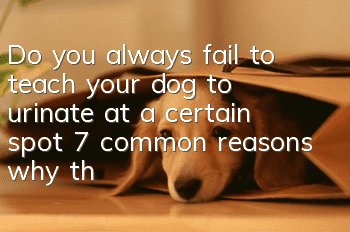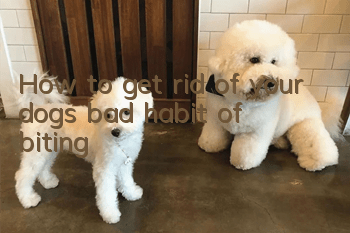Do you always fail to teach your dog to urinate at a certain spot? 7 common reasons why the owner will succeed if he does it right

Dogs have many bad habits, but their owners may not mind. But if a dog poops and urinates at home, making the house smelly and making the owner feel like he is living in a garbage dump, most people can't stand it. Therefore, letting dogs learn to urinate and defecate at fixed points and go to the toilet has become a must-learn skill for every dog in addition to "sit down". This is also a training that gives the owner a headache. Sometimes, even if the owner teaches the dog according to the fixed toilet training online, the dog never poops in the toilet or on the changing pad. Why is this?
Xiaomeng has collected 7 common reasons why owners fail to train their dogs to urinate and defecate at fixed spots, for reference by all owners.
1. The dog’s toilet is placed in the wrong location
Although there are many tutorials on the Internet, many of them do not mention the layout of the dog toilet, causing the owner to make mistakes from the beginning. Dogs are also clean animals and they don’t like to go to the toilet near where they sleep. If you place your dog’s pee pad or toilet next to the cage or dog bed, your dog will definitely not be able to use it nearby. Who wants to sleep next to their own excrement?
2. Mistakenly thinking that the dog knows the dog toilet and peeing pad
There are obviously dog toilets and peeing pads, but why do dogs no longer urinate on them? Because dogs are not born with the knowledge to go to the toilet or peeing pad when peeing. Thinking about when we were young, our parents took us to the toilet, and we gradually learned to solve problems in the toilet. To let the dog know where to go to the toilet, you can only use guidance and rewards at the beginning. Let the dog know that it can relieve itself in the toilet and get snack rewards.
3. Wrong use of cages
Puppies are not fully developed physically and cannot control their excretion well. A dog over 2 months old may need to go to the toilet every 2 hours. If the owner keeps the dog in the cage for too long, they will definitely poop in the cage. When crate training puppies, do not let them stay in the cage for more than 2 or 3 hours, otherwise they will not be able to bear it. Even for adult dogs, the time in the cage should not exceed 4 hours. The dog should be allowed to come out and exercise every once in a while.
4. The owner does not know the signs that the dog is going to urinate
If the owner suddenly sees the dog sniffing on the ground and spinning around in circles, this is a sign that they are in need of relief. The owner must guide them to the toilet immediately, otherwise the dog can't help but poop directly on the ground. Dogs are constipated and usually want to urinate and poop 15-25 minutes after eating. Therefore, when training dogs to urinate and defecate at fixed points, owners can easily master their toilet habits by feeding their dogs regularly and rationed amounts of food. No need to give extra snacks!
5. Punish dogs when they pull randomly
Sometimes when a dog poops at home, the owner will scold it loudly, and some owners will even spank it as punishment. In fact, this doesn't make much sense, because the puppy may not understand what you are angry about, and this will only make it more afraid of you. When a dog poops at home, it is best for the owner to ignore it, lead it away, and then clean it up silently.
6. Treat occasional success as the dog has learned
If the dog poops on the toilet for a day or two, the owner will mistakenly think that the dog has learned it, and will no longer reward him. In fact, this is wrong. Even dogs who are proficient in urinating at fixed spots still need occasional rewards. Several times of success does not mean that the dog has learned it. It must be at least until the dog can go to the toilet for a week before it can be considered that the dog has learned it. In addition, if the dog has learned it, the owner can reward it in different ways, not necessarily with snacks, but with praise or petting.
7. Forgetting to rule out the causes of physical diseases in dogs
Puppies have poor immunity and are prone to gastrointestinal diseases. At this time, it becomes more difficult to control excretion. It is best to pay more attention to other conditions of the dog to rule out whether it is caused by illness. Except for a few extremely smart dogs who can master it just a few times, many owners train their dogs to urinate and defecate in certain places, which is simply a hell-level difficulty. Is there anything that drives you craziest during this process?
- Is it okay for a puppy to bask in the sun?
- Dachshund training tips
- It’s a sign of your dog’s health. Check to see if your dog has any!
- Pay attention to these factors when training a Border Collie!
- What is the best medicine for border collie kennel cough?
- Are Beagles easy to raise? How to feed Beagles correctly?
- What's going on with the dog's diarrhea?
- How to get rid of tear stains on dogs
- Do I need to be vaccinated after being licked by a dog after being injured?
- Can canine distemper be transmitted to humans?



